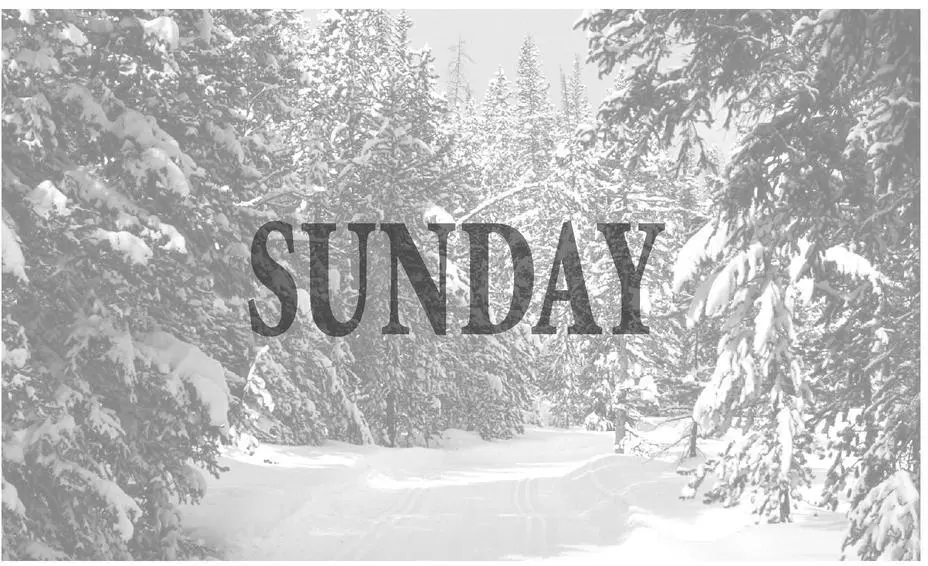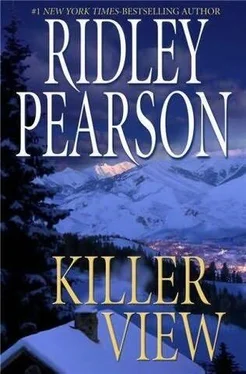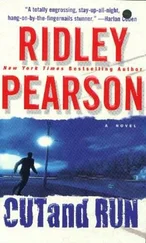He stopped. Turned. His mind counting down the time he was wasting. Then he saw it: a branch.
The track cut incredibly close to a twisted pine that had once been struck by lightning. It was a craggy old tree with a few sparse branches low enough to the ground to reach by jumping. Aker squatted and leaped, but his gloves slid off the only branch close enough to reach. He tried again, and again, but could not grab hold.
Now the snowmobile was crying out, well under way.
He jumped a fourth time and managed to hook his hands and lace his fingers over the branch. He walked his feet up the trunk, hooked a knee over the branch, and struggled up to a sitting position. With the adrenaline spent, he was far weaker than he’d first thought. He continued to climb, following the tree’s natural ladder. Two, three, four branches up; and now, looking down, he saw only branches. He moved himself higher, and on the opposite side of the tree from the track. He straddled the branch and kept himself against the trunk.
The snowmobile’s headlight winked through the woods, as the grind of the motor drew nearer. It was traveling slowly, and now a second light was revealed: a flashlight, searching both sides of the track.
Aker caught himself holding his breath as it came into view, staying in the track. Two men. Gearbox was driving, Coats, straddling the motorcycle-style seat behind Gearbox, holding the flashlight.
The snowmobile purred up the track approaching Aker’s tree, the flashlight alternately illuminating the forest on both sides, throwing harsh shadows that moved around in a jarring dance. It continued past.
A red taillight now. Nothing more. The sound grew more and more distant.
A person on foot was no match for a snowmobile. It would only take them minutes to realize they’d missed him.
Aker climbed down out of the tree as quickly as humanly possible. He landed back on the track and took off for the cabin. He tried to run but wasn’t up to it. It seemed to take forever to reach the camp, but it was only minutes. But how long until the snowmobile returned?
Inside the cabin now-the smell of burned hair and flesh, a nauseating stink-he stole a backpack, ripped a regional map off the wall, and stuffed it and other items into the zippered compartment: canned foods, matches, a church key, can opener, saltshaker, a fork, and a kitchen knife. He snatched up the syringes from the table and took the vials of insulin and the medication Coats had used to subdue him: opiates and narcotics. A pair of wool socks hanging by the woodstove. A wool cap. He grabbed a pair of snowshoes from a peg.
The sound of the snowmobile was suddenly louder. Closer…
He’d heard the two talk about spotting a cow elk by the salt lick. That meant game, which meant a game trail to follow. Out back, he briefly risked the flashlight, the moon having hidden behind the fast-moving clouds overhead. He couldn’t find the salt lick. The unbroken snow that formed an apron beyond the shed trapped him as neatly as a fence.
Leaving any tracks would give him away.
And there, in the flashlight’s beam, came his answer: two woodpiles, one for the split logs, neatly stacked very high, and, beyond it, a pile of ten or twelve massive tree trunks, ready for cutting and splitting. Small animals had greatly disturbed the snow in and around the logs; his tracks wouldn’t be easily noticed. By daylight, they might spot his route, but, if he hurried, he could be far gone by then.
He struggled up the pile of stacked wood, winded and weak. He fumbled his way over it and fell to the other side. Next, he took two great leaps in succession and reached the pile of felled trees. He clambered over this pile as well, the whine of the snowmobile fast approaching.
In all, he’d left but two prints in the deep snow, between the stacked wood and felled trees, both hidden by the woodpile itself. He crept under a tree’s snow-laden branches and out to the other side. Crawled under the branches of the next tree, to hide his tracks. He was at least twenty yards from the shed now.
The snowmobile’s engine coughed to silence. Coats shouted: “Fuck this! He can’t be far!”
Aker strapped on the snowshoes. His pursuers searched the far side of the cabin first, buying him precious time.
He found a rhythm in a half-speed run, leaning forward slightly to compensate for the added weight of the backpack. The adrenaline was back, and, with it, some needed energy.
He had no compass and no idea where he was. But he was no stranger to the outdoors and he knew where he was headed: as far away as he could get.

*
WALT STRUCK THE BRASS KNOCKER SHARPLY AGAINST THE plate on the front door. Despite a career of getting used to it, he was put off by the grandeur of the farmhouse and generational wealth it represented.
Brandon stomped his boots on the porch, trying to feel his feet.
“You sure about this, Sheriff? It’s almost three in the morning.”
“We’re not driving back over here tomorrow.”
“No offense, but you don’t smell so good.”
Walt smacked the door knocker-a brass cowboy boot-against the door again.
Standing beneath the porch roof, they didn’t see a light go on in a second-story window, but the snow behind them lit up from the glow, and Walt stepped back.
The door rattled and opened.
Senator James Peavy wore a pair of blue jeans with a sweater turned inside out. He squinted into the brightness of the porch light. His head of wispy white hair was thin on top, a fact usually hidden by the ubiquitous Stetson.
“Sheriff?” Astonishment. “Deputy?”
“We need a minute of your time,” Walt said.
“You come in here smelling like that, obviously you must,” said Peavy, waving them inside. “Come in.”
The parlor could have been from a homesteading museum. Peavy motioned for them to sit. Walt wanted to stand, but he took a seat on a blue velvet love seat with ruby piping. Brandon took the end of the piano bench, facing into the spacious room. Sheer curtains hung on the windows of air-bubbled, imperfect glass.
Peavy remained standing, an act that infuriated Walt. Perhaps sensing this, the rancher then sat down on the edge of a blue-and-white-crocheted slide rocker. He moved gently forward and back.
“So?”
“Why would Lon Bernie burn fifty head of sheep? And why in the dead of night?”
Peavy’s life in politics mixed with time spent in the great outdoors afforded him a wonderfully expressive face, gracious and kind and handsome. Even half awake, he possessed the countenance of a minister and the composure of a therapist.
“You want to talk about Lon Bernie’s sheep?” he said.
“I’d rather not dance around the issue. Mark Aker’s life is in play. Something’s going on here, and before I tear the lid off this thing I wanted to give you a chance to break it to me gently.”
“So you’re here out of thoughtful consideration, are you? At three in the morning?”
“This was a convenient time.”
“Not for all of us.”
“Radiation contamination,” Walt said.
Peavy scowled, an expression impossible to read as anything but surprise. “Jesus, what is that smell?”
“Help me out here, James,” Walt said. “What’s going on?”
“This is your party.”
“The invitation for me to go to Washington. That was your doing. Why?”
“Because I think you’re underrated, Walt. Sometimes we control the timing of the events in our lives, sometimes not. The vice president is eager for you to serve on a national level. Don’t think this was just me. You have more friends than you’re aware of.”
Читать дальше













